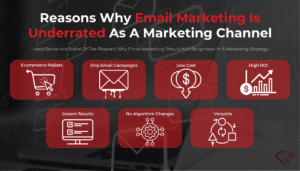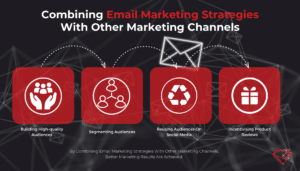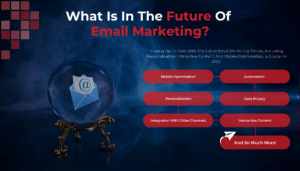[et_pb_section fb_built=”1″ admin_label=”section” _builder_version=”4.16″ global_colors_info=”{}”][et_pb_row admin_label=”row” _builder_version=”4.16″ background_size=”initial” background_position=”top_left” background_repeat=”repeat” global_colors_info=”{}”][et_pb_column type=”4_4″ _builder_version=”4.16″ custom_padding=”|||” global_colors_info=”{}” custom_padding__hover=”|||”][et_pb_text admin_label=”Text” _builder_version=”4.16″ background_size=”initial” background_position=”top_left” background_repeat=”repeat” global_colors_info=”{}”]
Email marketing is the practice of sending promotional or informational messages to a group of people via email. However, with the world of digital marketing constantly evolving, email marketing strategies must adapt to keep up with new trends and regulations.
In particular, recent movements towards data privacy-centric browsing and the phasing out of third-party data have caused a shift in the way businesses approach email marketing. With Google dropping third-party cookies in Chrome, and the iOS 14 update with its Intelligent Tracking Prevention feature (ITP), collecting first-party data and using it effectively has become more important than ever in order to maintain engagement with customers and potential customers.
In this blog post, we’ll explore the importance of email marketing in today’s digital landscape, how businesses can leverage it in the midst of changing data privacy regulations, and why it remains one of the most powerful and underrated forms of digital marketing available.
Reasons why email marketing is underrated as a marketing channel
Despite its effectiveness, email marketing is often underrated as a marketing channel. While some may consider it to be outdated or irrelevant in today’s world of social media and search engine advertising, email marketing remains one of the most powerful tools in a marketer’s arsenal.
In fact, email marketing has an average ROI of $36 for every $1 spent – making it one of the most cost-effective forms of marketing available. Let’s delve deeper into the reasons why email marketing should not be overlooked as a crucial component of any successful marketing strategy:
- Ecommerce mailers: One of the most effective uses of email marketing is to recover lost sales through abandoned cart emails, retargeting campaigns, and post-purchase follow-up emails. These types of campaigns can help increase conversion rates and revenue for e-commerce businesses.
- Drip email campaigns: Drip email campaigns are an excellent way to nurture leads and build relationships with prospects. By sending a series of targeted messages at set intervals, businesses can stay top of mind with their audience and encourage them to take the next step in the customer journey.
- Low cost: Email marketing is one of the most cost-effective marketing channels available. With minimal costs involved in creating and sending emails, businesses can achieve a high ROI with relatively little investment.
- High ROI: As previously mentioned, email marketing has one of the highest ROIs of any marketing channel. By targeting the right audience with the right message at the right time, businesses can drive significant revenue through email campaigns.
- Instant results: With a well-maintained email database, businesses can quickly send targeted messages to their audience and see instant results. Unlike other marketing channels that may take time to gain traction, email marketing can provide immediate feedback and allow for rapid iteration and improvement.
- No algorithm changes: Unlike other marketing channels that are subject to the whims of ever-changing algorithms, email marketing is a more stable and predictable channel. As long as businesses comply with email regulations and maintain good email practices, they can consistently reach their audience without worrying about algorithm updates.
- Versatile: Email marketing can be used for a variety of purposes, from building customer loyalty to promoting new products or services. By sending targeted messages to the right audience at the right time, businesses can use email marketing to nurture relationships with prospects and customers alike.

Combining email marketing strategies with other marketing channels
By combining email marketing strategies with other marketing channels, businesses can build high-quality audiences, improve targeting and segmentation, and incentivise customer engagement to drive better marketing results across all channels. Here are some examples:
- Building high-quality audiences: Email marketing can be used to collect valuable 1st party data by creating lead magnets or utilising lead forms on social media platforms like LinkedIn. These email addresses can be used to build a high-quality audience that is more likely to engage with future marketing efforts.
- Segmenting audiences: By analysing how customers interact with email campaigns, businesses can segment their email databases into different groups based on levels of engagement, behaviour, or demographics. This can help businesses tailor future messaging and marketing efforts to the specific needs and preferences of each group.
- Reusing audiences on social media: Email marketing data can be used to create custom audiences on social media platforms, allowing businesses to retarget users who have not yet converted but have shown interest in their brand by signing up for their email list. Additionally, businesses can use email data to create lookalike audiences on social media platforms, targeting users who have similar characteristics to their most valuable customers.
- Incentivising product reviews: Email campaigns can be used to incentivise customers to leave product reviews on other channels, such as social media or review sites. By offering incentives like discounts or exclusive content, businesses can encourage customers to engage with their brand in a meaningful way that can also help drive future sales.

What is the future of email marketing?
To stay ahead of the game in email marketing, it’s important to keep up with the latest 2023 marketing trends, such as personalisation, interactive content, and mobile optimization. As technology continues to advance, the future of email marketing is likely to be shaped by several key trends and developments:
- Mobile optimisation: With nearly 62% of emails now being opened on mobile devices, optimising email campaigns for smaller screens is becoming increasingly important. Emails that are not optimised for mobile devices risk being ignored or deleted, so marketers must ensure that their messages are mobile-friendly to remain effective.
- Automation: Email automation will continue to be a crucial component of email marketing in the future. Automated emails enable marketers to deliver personalised messages at scale, saving time and resources while still providing a highly targeted customer experience. With more advanced automation tools, marketers will be able to create even more sophisticated email campaigns with dynamic content, advanced personalisation, and triggered messaging.
- Personalisation: The use of data and AI will continue to drive greater personalisation in email marketing, helping marketers create more relevant and targeted messages for individual customers. Personalised emails not only increase engagement rates, but also improve customer loyalty and retention. In the future, marketers will be able to leverage more advanced data analytics and machine learning to create even more sophisticated personalisation strategies.
- Data privacy: As data privacy concerns continue to grow, email marketers will need to be transparent about their data collection and usage practices, and take steps to secure customer data. This will include complying with regulations like GDPR, ADPPA and the POPI Act, as well as implementing best practices for data security and privacy.
- Integration with other channels: Email marketing will continue to become more integrated with other digital marketing channels, allowing for a more seamless and cohesive customer experience. For example, email campaigns can be used to drive traffic to social media platforms, while social media can be used to drive email subscriptions. By integrating email with other channels, marketers will be able to create more consistent messaging and improve customer engagement.
- Interactive content: Interactive content such as quizzes, surveys, and polls will become more popular in email marketing, providing a more engaging experience for recipients. Interactive content not only encourages customer engagement, but also provides valuable data and insights that can be used to further personalise future email campaigns.
- User-generated content (UGC): User-generated content can be a powerful way to engage customers and build brand loyalty. In the future, email marketers may leverage UGC in email campaigns to showcase customer testimonials, reviews, and social media posts.
- Video content: The use of video in email marketing is expected to grow in popularity, providing a more engaging and immersive experience for recipients. With the increasing availability of video creation and hosting tools, email marketers will be able to easily incorporate video into their email campaigns.
- Augmented reality (AR): As AR technology becomes more mainstream, email marketers may leverage AR to create interactive and immersive experiences for customers. For example, customers could use their smartphone camera to scan an email and see a virtual product demonstration or try-on.
- Voice technology: With the rise of voice assistants like Siri and Alexa, email marketers may explore new ways to incorporate voice technology into email campaigns. For example, customers could use voice commands to respond to emails, unsubscribe from mailing lists, or even make purchases directly from their inbox.

By embracing these email marketing trends and staying ahead of the curve, marketers can continue to leverage email as a powerful marketing channel for years to come.
In conclusion
Despite being often underrated as a marketing channel, email marketing remains one of the most powerful and cost-effective ways for businesses to engage with their audience. By leveraging the many benefits of email marketing, including low cost, high ROI, and versatility, businesses can build high-quality audiences, increase engagement, and drive revenue.
Looking to the future, email marketing will continue to evolve to meet the needs of changing customer behaviour and technological advancements. With exciting new trends like mobile optimisation, automation, personalisation, and AI on the horizon, email marketing has never been more exciting or full of potential.
At Ruby Digital, we specialise in high-performance email marketing campaigns that help businesses achieve their goals. Whether you’re looking to build brand awareness, drive engagement, increase revenue, or better comply with email marketing trends and best practices, our team of experts can help you create and implement an email marketing strategy that delivers results. Get in touch with us today to learn more!
[/et_pb_text][/et_pb_column][/et_pb_row][/et_pb_section]



